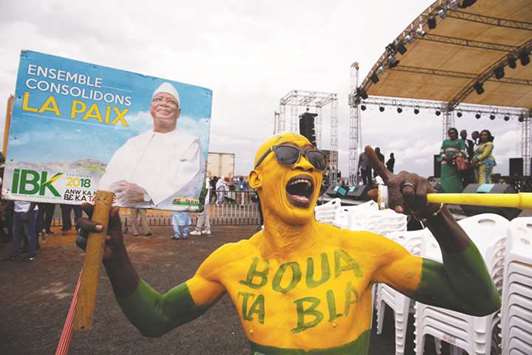Whoever wins Mali’s election tomorrow (Sunday), will need to urgently address growing ethnic violence in its central region, where religious extremists are sowing chaos in the “breadbasket” of the largely desert nation, the UN mission chief said yesterday.
Malians will decide whether to give President Ibrahim Boubacar Keita a second term or hand over to one of his rivals.
The backdrop to the poll is the worst insecurity since a Tuareg rebellion was hijacked by Islamists in 2012, forcing France to intervene a year later to push them back.
Religious extremists have made near daily attacks against UN peacekeepers and Malian troops around cities like Timbuktu in the desert north.
More concerning is an incursion by Islamists into Mali’s centre over the past three years, where they have exploited land tensions between Fulani cattle herders and farming peoples.
“The ease with which terrorists have managed to infiltrate the centre, which is the breadbasket of the country ... and spread intercommunal conflict and violent extremism ... is very troubling,” the Chadian head of the UN peacekeeping mission in Mali (MINUSMA), Mahamat Saleh Annadif, told Reuters. “The new president must apply himself seriously to end ... the conflict.”
Underscoring his warning, government and local sources said that a number of civilians had been killed in ethnic violence on Wednesday near the town of Djenne, in the breadbasket region.
One local source put the death toll at 18.
Keita, 73, runs for re-election amid a rising death toll from violence.
He and two dozen other candidates have pledged to reverse Mali’s decline, which has enabled Islamists to use Mali as a launchpad for attacking Western targets across the region.
The centre gets more rain than Saharan areas to the north, causing the Niger river to flood its banks and provide fertile ground for growing rice and other staples.
Officials fear Islamist attacks and the collapse of the state in rural parts are hurting Mali’s food supply.
Some 400,000 Malians are in need of food aid, UN statistics show.
“We do not want a permanent terrorist presence in central Mali. That’s the danger, because they have recruited a lot of youths,” Annadif said.
He said that the MINUSMA is working with the state on several projects, such as re-integrating former fighters who lay down their arms.
He was encouraged that Mali’s public prosecutor was investigating alleged abuses by the armed forces, including links to mass graves in central Mali.
In their relentless attacks, religious extremists have killed 160 peacekeepers – making it the deadliest mission to date.
Some have called for a more robust mandate.
“MINUSMA is supposed to be a peace mission, not a force for fighting terrorism,” Annadif said, adding that the UN secretary general is aware of concerns over their mandate, as well as equipment and other resources. “The peace mission is evolving in an environment of asymmetric warfare and terrorism. I think ... we will adapt to it.”

Supporters of Ibrahim Boubacar Keita attend a rally in Bamako.
